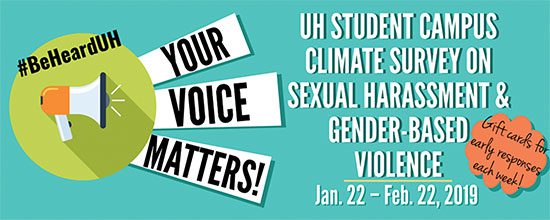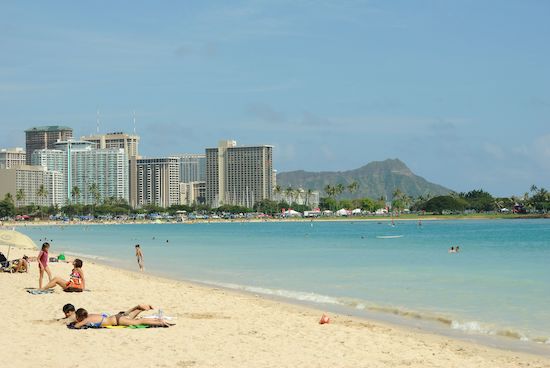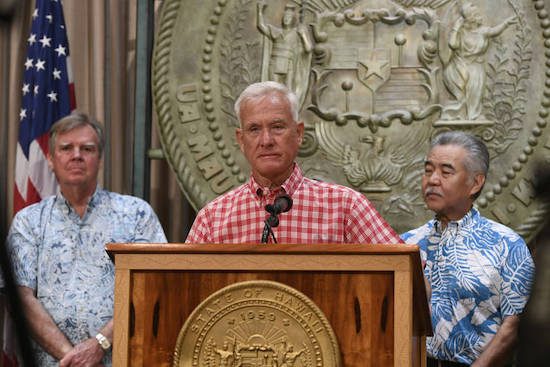
WCC Campus Climate Survey Results: What We Now Know
From Jan. 22-Feb. 22 last year, all UH campuses sent out the second Campus Climate Survey to registered students. The purpose of the survey was to gain a better understanding of what our students experience at each campus in regards to sexual harassment and gender-based violence. Specifically, the survey asked about sexual harassment, stalking, dating violence and domestic (or intimate partner) violence.
For this recent survey, there was a 1.4 percent increase in the number of student participants, giving us a better picture than in the past. For the community colleges, there was an increase in participation from 6.7 percent to 11.3 percent. More specifically, WCC had a response rate of 12.2 percent.
The survey will continue to be conducted every two years. The more that students participate, the better our data will be to help each campus address the issues surrounding gender-based violence. Here are the findings of the survey.
Sexual Harassment
WCC campus-specific data indicates that our students are struggling with sexual harassment at rates higher than all the other community college campuses. Further data indicates that a majority of this harassment is by their fellow students–either friends, acquaintances or classmates. Behaviors that are part of sexual harassment include inappropriate comments or sexual remarks.
Both KCC and WCC students reported significantly more incidents than all other community colleges, ranging from three to five incidents in the current academic year.
Stalking
Stalking behavior on WCC campus decreased at a significant rate (4.2 points) for unwanted communication bringing the rate down to 1.7 percent from a previous rate of 5.9 percent. However, the rate at which unwanted in-person appearances occurred is trending upward.
In relation to the perpetrators of stalking, WCC students are more likely than students at other campuses to know their stalker. In comparison to other campuses, WCC students reported their stalkers having much more control over their everyday activities.
Dating & Domestic Violence (DDV)
All campuses in the UHCC system showed increases in DDV at 26.7 percent, up from 19.5 percent in 2017. WCC students reported a significant increase in DDV, jumping 12.5 percent. This translates to one in five WCC students reporting experiencing DDV during the current academic year.
In comparison to other CC campuses, WCC students reported the highest incident rate of physical force against them. This is 4 percent higher than the average for UHCC. Students further reported that most of them were in a relationship with the perpetrator when the incidents occurred and continue to remain in the relationship with the offender.
Though this is a quick snapshot of some of the survey results, it indicates to our campus community that there is much work to be done to support our students.
There are multiple resources on campus to assist students who may be dealing with any of these gender-based harassment issues. While some resources are not confidential, there are two which are: our CSAP advocate Doka Kumagai and our Mental Health & Wellness counselor Desrae Kahale (see contact information below).
Gender-based violence is known to cause issues in multiple areas of one’s daily life, and the 2019 Climate Survey indicated such for all of the campuses. The areas of impact include: one’s physical, emotional and social well-being.
Not excluded from this list is academics. When a student is impacted by gender-based violence, the entire campus community is impacted along with them. WCC continues to work on ensuring all of its students can access their education in a safe and supportive environment that is free from both discrimination and harassment.
In order to do this, we must talk about it and create change. For more information on the survey results, go to: www.hawaii.edu/titleix/survey/results/.
CSAP Advocate Doka Kumagai
Hale Kako`o 110
808-294-5483
madokak@stoptheviolence.org
Mental Health & Wellness
Desrae Kahale
Hale Kako`o 101
808-235-7393
dkahale3@hawaii.edu
Title IX Coordinator
Karla Silva-Park
Hale ‘Akoakoa 220
808-235-7468
karlas@hawaii.edu
by Karla Silva-Park, LMHC, NCC





